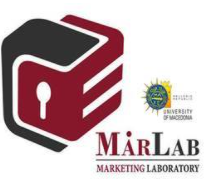MarLab commits itself to promoting the highest standard of professional ethical norms and values for its members (researchers, partners, practitioners, academics and students). Norms are established standards of conduct that are expected and maintained by society and/or professional organizations. Values represent the collective conception of what communities find desirable, important and morally proper. Values also serve as the criteria for evaluating our own personal actions and the actions of others. As researchers, the MarLab members recognize that they not only serve the academic community but they also act as stewards of society in creating, facilitating and executing the transactions that are part of the larger economy. In this role, MarLab members are expected to embrace the highest professional ethical norms and the ethical values implied by their responsibility toward multiple stakeholders (e.g., customers, employees, citizens, investors, businesses, peers, other MarLab members, regulators and the host community).
MarLab members are committed to:
Honesty
Strive for honesty in all scientific communications. Honestly report data, results, methods and procedures, and publication status. Do not fabricate, falsify, or misrepresent data. Do not deceive colleagues, granting agencies, or the public.
Objectivity
Strive to avoid bias in experimental design, data analysis, data interpretation, peer review, personnel decisions, grant writing, expert testimony, and other aspects of research where objectivity is expected or required. Avoid or minimize bias or self-deception. Disclose personal or financial interests that may affect research.
Integrity
Keep promises and agreements; act with sincerity; strive for consistency of thought and action.
Carefulness
Avoid careless errors and negligence; carefully and critically examine your own work and the work of your peers. Keep good records of research activities, such as data collection, research design, and correspondence with agencies or journals (e.g., conference organizing committees or journal editors).
Openness
Share data, results, ideas, tools, resources. Be open to criticism and new ideas.
Confidentiality
Protect confidential communications, such as papers or grants submitted for publication, personnel records, trade or military secrets, and patient records.
Responsible Publication
Publish in order to advance research and scholarship, not to advance just your own career. Avoid wasteful and duplicative publication.
Responsible Mentoring
Help to educate, mentor, and advise students. Promote their welfare and allow them to make their own decisions.
Respect for Intellectual Property
Honor patents, copyrights, and other forms of intellectual property. Do not use unpublished data, methods, or results without permission. Give credit where credit is due. Give proper acknowledgement or credit for all contributions to research. Never plagiarize.
Respect for colleagues
Respect their colleagues and treat them fairly.
Social Responsibility
Strive to promote social good and prevent or mitigate social harms through research, public education, and advocacy.
Non-Discrimination
Avoid discrimination against colleagues or students on the basis of sex, race, ethnicity, or other factors that are not related to their scientific competence and integrity.
Competence
Maintain and improve their own professional competence and expertise through lifelong education and learning; take steps to promote competence in marketing science as a whole.
Legality
Know and obey relevant laws and institutional and governmental policies as well as policies of the University of Macedonia.
Human Subjects Protection
When conducting research on human subjects; minimize harms and risks and maximize benefits; respect human dignity, privacy, and autonomy; take special precautions with vulnerable populations (e.g. children, patients, refugees, handicapped); and strive to distribute the benefits and burdens of research fairly.
Unethical Actions
There are many other activities that the law does not define as “misconduct” but which are still regarded by most researchers as unethical. These are called “other deviations” from acceptable research practices and include:
- Publishing the same paper in two different journals without telling the editors
- Submitting the same paper to different journals without telling the editors
- Not informing a collaborator of your intent to file a patent in order to make sure that you are the sole inventor
- Including a colleague as an author on a paper in return for a favor even though the colleague did not make a serious contribution to the paper
- Discussing with your colleagues confidential data from a paper that you are reviewing for a journal
- Trimming or manufacturing a data set without justifying scientifically or discussing the reasons in their paper
- Stretching the truth on a job application or curriculum vita
MarLab and its members shall not discriminate in its programs and activities based on race, color, sex, sexual orientation, religion, national origin, age, genetic information, or disability, or status.

